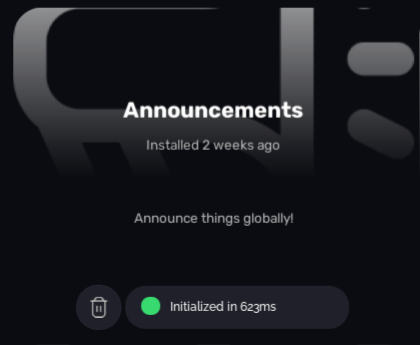RichConfig
RichConfig is a property of Apps which is used for bootstrapping apps. It returns a table which is used for Administer knowing what to do with your app and identifying it.
You can construct a new RichConfig object using the new() constructor like so:
local Apps = require("/Administer/Loader/Modules/Apps")
local MyConfig = Apps.InvocationAPI.RichConfig()It will return the following blank RichConfig object:
{
AppMeta = {
Name = "Default App",
Icon = "",
Version = "0",
Description = "This is an application which is improperly configured."
},
Dependencies = {
Administer = "2.0.0",
SettingsAPI = "1.0",
AppPlatform = "2.0",
AdministerModules = {},
IsAdministerVersionRelevant = true
},
TextCommands = {},
State = {}
}In order for your app to compile, you need to properly fill out every field, including some which are not present in the default one (ClientFrame and Bootstrap)
AppMeta
This section has the metadata for your app. It doesn't change anything functionally, only how it is displayed in the Library:

Dependencies
The Dependencies section tells Administer how your app should run. Please refer to the following table.
| Property | Purpose | Layout |
|---|---|---|
| Administer | Administer versions your app will run on | StdVersion |
| SettingsAPI | Which version of the SettingsAPI will your app run with? | StdVersion |
| AppPlatform | App API version required for your app to build | StdVersion |
| AdministerModules | Administer modules which will be passed through to your MainHook | See below |
| IsAdministerVersionRelevant | Whether or not Administer being out of date will prevent your app from starting | boolean |
AdministerModules
The AdministerModules field allows you to request server modules that should be given to your Bootstrap hook at runtime. You can request anything in the Modules folder with the following:
{
Type = "SERVER",
Name = "Utilities"
}So a completed write will look like the following:
RichConfig.Dependencies.AdministerModules = {
{
Type = "SERVER",
Name = "AdminRunner"
},
{
Type = "SERVER",
Name = "Utilities"
}
}StdVersion
StdVersion (StandardVersion) is a string which specifies which versions of a platform your app may support. Here are some examples:
RichConfig.Dependencies.Administer = "min:2.0.0;max:3.0.0"RichConfig.Dependencies.Administer = "min:1.2.0;max:1.2.3"RichConfig.Dependencies.Administer = "2.0.0"Bootstrap
This is the function that Administer provides data with to initialize your app.
RichConfig.Bootstrap: () -> (
{},
any, --// RichConfig.State value
{
FinishTime: string,
RunContext: string,
RanksWithAccess: number,
Modules: { { any } }?
}
): { boolean, {}? }ClientFrame
This is what the client will get from your app if they have access. It can be a Frame, CanvasGroup, or LocalScript.
